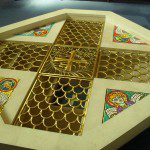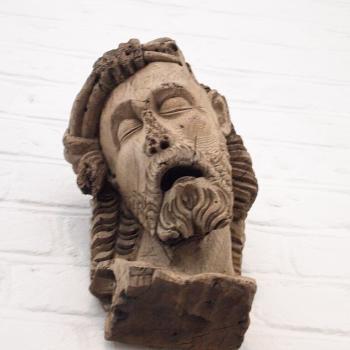Thou wast transfigured on the mount, O Christ God,/ revealing Thy glory to Thy disciples as far as they could bear it./ Let Thine everlasting light shine upon us sinners/ through the prayers of the Theotokos, O Giver of Light, glory to Thee (Troparion for the Transfiguration)
The light of truth which transcends the darkness of our minds requires us to be patient until we have found ourselves adjusted to the light. In that patience, we must still our thoughts and words, silencing ourselves so that we can let the light shine on with its brilliance, while we take it in without putting any barrier between us and it.
For when we come from darkness into the light, we will at first be unable to take it in. It will blind us with its brilliance, confusing us, and if we come unprepared, we might want to turn back into the darkness which we came from, never coming to the light and its glory. If we have silenced our thoughts, we will be able to stop ourselves from turning around, and so we will find ourselves bathing in the glory of the light, taking in its beauty, finding ourselves joining in with it, becoming a part of it as it penetrates us and enlightens us with its glory.
And yet, even for the best of us, the brightness of the light blinds us, coming as a bright darkness which we cannot possibly comprehend; even when we adjust ourselves to the light, when it is bright and strong, we cannot look directly at it without causing ourselves harm, just like how our eyes cannot directly grasp the brightness of the sun in a solar eclipse without having the light cause permanent harm to them.
Therefore, when Jesus took Peter, James and John to Tabor, to see the light of his glory, it was a tremendous event, one which enlightened the Apostles according to the spiritual maturity they had achieved and yet they still had to silence themselves and wait before they could truly understand what it is they had witnessed:
And after six days Jesus took with him Peter and James and John his brother, and led them up a high mountain apart. And he was transfigured before them, and his face shone like the sun, and his garments became white as light. And behold, there appeared to them Moses and Elijah, talking with him. And Peter said to Jesus, “Lord, it is well that we are here; if you wish, I will make three booths here, one for you and one for Moses and one for Elijah.” He was still speaking, when lo, a bright cloud overshadowed them, and a voice from the cloud said, “This is my beloved Son, with whom I am well pleased; listen to him.” When the disciples heard this, they fell on their faces, and were filled with awe. But Jesus came and touched them, saying, “Rise, and have no fear.” And when they lifted up their eyes, they saw no one but Jesus only. And as they were coming down the mountain, Jesus commanded them, “Tell no one the vision, until the Son of man is raised from the dead” (Matt. 17:1-9 RSV).
Peter, James and John were taken up Mount Tabor; they went from the darkness of ordinary being to see the light of the Sun of Righteousness. But they could not comprehend it. They were shown the unity of the Father and the Son, they were able to see and experience the glory of the divinity of Christ, the glory which he had otherwise emptied from himself as he assumed human nature so he could come to us and engage us in a humble form. They had become witnesses to the truth of the Trinity, but that truth transcended them; they were ready for a glimpse of it, so that they could be drawn further towards the glory of Lord, but they still came to it, full of their own thoughts and ideas as to who they thought Jesus was and what he would be doing as the messiah, so they were unable to truly understand what they had seen and so were told to be silent until their minds were cleared from the dust of sin. Jesus to die and be raised form the dead before they would truly understand his ministry, who he was, and what he had done. If they had taken the little they had encountered and tried to understand and explain it, they would have failed, and caused others to err. Of after the resurrection would they be able to speak and reveal to others what they had witnessed; only after the fullness of revelation was given through the death and resurrection of Christ, would they understand the true glory of God which was a glory not to be grasped after and held on to, but a glory which is to be handed out in love and shared by all in their own imitation of Christ with their own kenosis. They had to empty themselves completely of all their thoughts and ideas, all their hopes and dreams, of all their worldly and otherworldly attachments, so that in that death to the self they could receive the fullness of the light in themselves and find themselves truly enlightened by God.
Peter certainly had to learn to empty himself of all attempts of glory, and he did this through his own personal failure. He had ascended the mountain, but it was only by grace, not his own effort or power, that allowed him to see a glimpse of the glory of the Son. He had ascended but he thought he could hold on to the greatness which he had beholden. He thought he could just put himself with Christ, attach himself to his vision of Christ, and follow after Christ from glory to glory. Peter did not understand the true glory which was to come, the glory to be revealed in the death of the Son, in the humble weakness by which Christ was going to reveal his love to the world. When Jesus was judged by the injustice of humanity, Peter fled, denying his own association with Christ. Three times he denied Christ before he heard the cock crow; at the dawn of the new day, Peter had lost it all. All that he thought he had attained by being with Jesus seemed to be as nothing, for it seemed that Jesus was not going to fulfill Peter’s expectations, becoming a world-conquering monarch with Peter as his head of state. The Sun of Righteousness had gone down to the depth s of the earth, and the darkness which came upon the land had revealed to Peter the emptiness of his life, of all that he had done until them. He was not truly ready for the glory of God, and when the Sun of Righteousness rose from the depths of the earth, then Peter was ready to look at him and see and understand him with spiritual eyes cleansed from the dust of pride. Only then could Peter be the witness to the truth he was called to be. The glory of the resurrection was the completion of the glory of the Transfiguration, and indeed, its superior because it showed that not only did Christ possess that glory when he was in his earthly ministry, but it showed nothing, not even death, could take it away; it was only his to give, and give is what he did, out of his love.
Thou wast transfigured on the mountain, O Christ our God,/ and Thy disciples beheld Thy glory as far as they were capable,/ that when they should see Thee crucified,/ they might know that Thy suffering was voluntary/ and might proclaim to the world/ that Thou art indeed the reflection of the Father (Kontakion Transfiguration).
True glory is not found in the accumulation of mere power, but by emptying oneself of all such assumed attainment of power and glory for oneself so that the glory of God can find room within so as to shine on and reveal the glory of his love. Jesus gave all he is in love, giving his life so that we can inherit his bounty, the love of his Father, the love which is his own glory. What was revealed to Peter and James and John was the glory of the Son, the glory of our inheritance, the light of Tabor, the grace which is to penetrate us and lift us up outside of ourselves and into the divine life. Peter, once he was able to understand what he witnessed through the lens of the resurrection, then was able to preach of his experience and use it to point others the way to glory:
For we did not follow cleverly devised myths when we made known to you the power and coming of our Lord Jesus Christ, but we were eyewitnesses of his majesty. For when he received honor and glory from God the Father and the voice was borne to him by the Majestic Glory, “This is my beloved Son, with whom I am well pleased,” we heard this voice borne from heaven, for we were with him on the holy mountain. And we have the prophetic word made more sure. You will do well to pay attention to this as to a lamp shining in a dark place, until the day dawns and the morning star rises in your hearts (1 Ptr. 2:16-19 RSV)
Peter followed Christ. He saw the sun of righteousness; at the Transfiguration, that light and glory was all external to him. Later, it was to come into him, dwell in him, rise up in him, so that he would find himself one with it and participating in the divine life instead of merely witnessing it outside of himself and staying apart from it.
What Peter experienced is offered to all: participation in the divine life as adopted children of God the Father. When we first see and experience something of the beauty or glory of God, we see it as something external to us. We see it, we speak of it, we praise it, we find ourselves drawn to it, but, until we silence ourselves, we will focus too much on the extrinsic qualities of that light and so keep it apart from us, never letting it into ourselves. We will see it, reach out for it, and draw near it only to be blinded by it and so forever held back from it. When we try to seize it, we will fail; when we think ourselves great for seeing it, we will only fall back down the mountain and deny it, and then the true trial will come: will we understand our failure and so deny ourselves, opening ourselves to the light and let it shine in u, becoming one with it, or will we despair?
Truly, our darkness, our sin, will never comprehend the light; if we seek it in the darkness of self-glorification, we will be lost in that darkness and despair. We must be silent so we can prepare ourselves to a new way of understanding it if we want it to lift us up from within. Our words, our speech, our way of thought, all can keep it distant from us because such noise keeps us thinking dualistically about that glory and so we act in such a way as to keep it distant from us. Silence allows us to humble ourselves, and cut off our sense of pride. That pride creates within us a false sense of glory, a self-glory, which binds us to ourselves away from the light, and so as long as we are turned in to ourselves, we are turned away from the light and do not let it truly come within. Once we keep that silence, and turn away from all thoughts of the self, we will be able to welcome that light in us and find ourselves joining in with it as that light becomes a part of us and we a part of it. It will shine in us, with us, through us, and beyond us – it will be incomprehensible, but yet it will be our life, our glory. We will no longer despair, for we will be light with the light, partakers of that transcendent glory of God.
[Image=Transfiguration fresco. St. George Church:Kurbinovo, Macedonia via Wikimedia Commons]
Stay in touch! Like A Little Bit of Nothing on Facebook:
A Little Bit of Nothing













